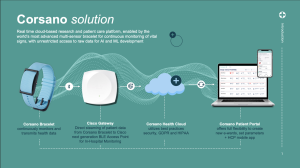
In the age of digital transformation, healthcare is experiencing a revolutionary shift with the advent of smart hospitals. Combining advanced technologies like IoT, AI, and robotics, these facilities redefine patient care and hospital management. In this blog, we’ll explore the key features, innovative trends, and the future of smart hospitals.
What Is a Smart Hospital?
A smart hospital is a facility that leverages advanced technologies to transform traditional systems and improve operational efficiency, and overall healthcare delivery. It integrates tools such as IoT, AI, machine learning, real-time data analytics, and automation to optimize processes and enhance decision-making. By connecting devices, equipment, and systems, smart hospitals create a seamless ecosystem where critical information flows effortlessly between healthcare providers, patients, and medical assets. This connected infrastructure ensures efficient resource management, streamlined workflows, and personalized care tailored to individual patient needs. Moreover, smart hospitals are designed to proactively respond to challenges, enabling more accurate diagnoses, faster treatments, and improved safety protocols. Ultimately, they represent the future of healthcare, combining technology and innovation to set new standards in patient-centered care.
Key Features of Smart Hospitals
Connected Network Infrastructure
Smart hospitals rely on a robust, interconnected network infrastructure to seamlessly connect IoT devices, AI-powered systems, medical equipment, and healthcare software. This network enables real-time communication and data sharing across various systems, ensuring efficient coordination, precise diagnostics, and personalized patient care. By integrating these technologies, smart hospitals create a connected ecosystem that enhances operational efficiency and accelerates decision-making processes.
IoT-Enabled Devices
IoT-enabled devices play a key role in smart hospitals. They connect medical equipment, patient monitoring systems, and smart beds to a centralized network. These devices provide real-time tracking of vital signs, allowing healthcare providers to monitor patient health remotely and respond quickly to emergencies. Additionally, IoT facilitates medical asset tracking, ensuring optimal resource utilization and improving overall operational efficiency, while delivering enhanced patient care.
Automated Workflows
Automation in smart hospitals streamlines workflows, improving operational efficiency by reducing human error and optimizing staff productivity. Routine tasks such as patient check-ins, inventory management, and medical records updates can be handled by automated systems, saving time and ensuring accuracy. This allows healthcare staff to focus more on direct patient care, enhancing overall service quality and patient satisfaction.
Electronic Medical Records
Electronic Medical Records (EMR) systems centralize patient information, ensuring healthcare providers have quick access to medical histories, lab results, and treatment plans, through a secure digital platform. In smart hospitals, EMR systems enhance care coordination by ensuring seamless information sharing across departments. They also minimize errors by standardizing documentation.
Benefits of Smart Hospital Operations
Improved Patient Care
Smart hospitals leverage real-time monitoring and data analytics to track patient vitals and health metrics. This enables faster responses to critical situations, reducing delays in treatment. Connected devices, such as wearable sensors and IoT-enabled equipment, facilitate continuous care by providing accurate, up-to-date information. This significantly minimizes the likelihood of medical errors. This integration ensures more informed decision-making, leading to improved patient outcomes and a higher standard of care.
Enhanced Operational Efficiency
Enhanced operational efficiency in smart hospitals is achieved through automation, real-time data analysis, and asset tracking, which streamline patient flow and optimize resource allocation. AI-driven systems further boost efficiency by predicting bottlenecks, suggesting adjustments to staffing levels, and managing hospital resources proactively. These technologies minimize waste and improve operational speed, enabling hospitals to deliver timely and effective care.
Cost Reduction
Smart hospitals reduce operational costs by optimizing resource utilization, automating routine tasks, and minimizing manual errors, which collectively increase efficiency and lower waste. Additionally, predictive maintenance for hospital equipment prevents costly breakdowns and extends asset longevity, improving utilization. Platforms like Cisco Spaces enhance cost-saving measures by enabling accurate asset tracking and maintenance scheduling, further reducing operational expenses.
Accelerated Medical Research
Real-time data and advanced analytics in smart hospitals accelerate medical research by offering researchers accurate, up-to-date patient information, enabling faster identification of trends and outcomes. AI and IoT devices streamline clinical trials by automating patient response monitoring and collecting precise data, helping researchers gain actionable insights efficiently. This integration fosters innovation and reduces timeframes for breakthroughs in treatment and healthcare studies.
Increased Energy Efficiency
Smart hospitals optimize energy usage by utilizing smart lighting, automated HVAC systems, and real-time environmental monitoring to adjust energy output based on occupancy and needs. These technologies significantly reduce energy consumption while maintaining comfort, lowering utility costs, and creating a more sustainable operational model. By prioritizing energy efficiency, smart hospitals contribute to both environmental conservation and cost savings.
Smart Trends for the Future of Healthcare Systems
Emerging technologies such as Wi-Fi 7, AI, IoT, telemedicine, and robotics are reshaping healthcare, driving innovation toward more connected, personalized, and efficient systems. These advancements promise to enhance patient care and operational workflows while expanding access to critical services.
- Wi-Fi 7 for Real-Time Healthcare Connectivity: Wi-Fi 7 is transforming healthcare networks with ultra-fast, low-latency connections, enabling seamless integration of IoT devices, continuous patient monitoring, and enhanced telemedicine applications for real-time care delivery.
- AI and Machine Learning in Diagnostics: AI and machine learning are advancing healthcare with improved diagnostics and tailored care recommendations based on real-time data and historical patient patterns.
- Telemedicine and Remote Care: Smart hospitals utilize IoT devices and AI-driven platforms to facilitate telemedicine and remote care, expanding healthcare access for underserved areas while reducing the need for in-person visits.
- Robotics and Automation in Surgery and Patient Care: Robotics enhance surgical precision, while automation of routine care tasks increases efficiency, reduces errors, and ensures better patient outcomes in both treatment and recovery settings.
How Cisco Spaces is Creating Hospitals of the Future
Cisco Spaces empowers hospitals to become more connected, efficient, and patient-centered. It achieves this by providing advanced real-time insights and integrating seamlessly with partner apps and systems. This enhances operational and patient care workflows.
Smart Asset Management: By integrating with IoT-enabled tags and sensors, Cisco Spaces provides visibility into the real-time location of critical medical equipment. This helps reduce downtime and improve asset management, while operational tracking and management are facilitated through partner systems integrated with the platform.
Environmental Monitoring: Cisco Spaces uses data from environmental sensors to deliver insights on temperature, humidity, and air quality across pharmacies, patient rooms and other hospital areas. These insights help optimize recovery conditions and maintain ideal conditions for temperature-sensitive drugs and vaccines.
Patient and Visitor Experiences: Cisco Spaces supports enhanced patient and visitor experiences by enabling location-based services like contextual engagements. While the platform powers real-time insights, apps and tools built on Cisco Spaces ensure smooth navigation and notifications for patients and visitors.
Case Study: NHS Foundation
The NHS Foundation Trust, UK, utilized medical equipment tracking technology to ensure reliable access to critical devices within the hospital. Trackable tags were implemented on all essential medical equipment, enabling seamless real-time tracking of assets. These tags were connected to the hospital’s Wi-Fi network and integrated with Cisco Spaces to streamline asset management. This solution allows hospitals to efficiently locate critical equipment when needed, minimizing delays in patient care. By optimizing equipment availability and management, the NHS was able to reduce operational costs and improve operational efficiency.
Transform Into a Smart Hospital with Cisco Spaces
Smart hospital technology is revolutionizing healthcare environments by enabling hospitals to make better use of resources, streamline workflows, and provide exceptional patient care. This transformation brings measurable outcomes, such as enhanced equipment utilization, occupancy monitoring, and real-time asset tracking, all critical for optimizing hospital operations.
Cisco Spaces plays a pivotal role in enabling this transformation by offering seamless IoT integration and robust asset management tools. Using powerful features like location analytics Cisco Spaces turns physical hospital buildings into smart spaces tailored for patient-centered operations. It empowers hospitals to track critical medical equipment in real-time, monitor space usage via reliable data analytics, enhance patient and staff safety through panic buttons and more. All of this ensures operational excellence while prioritizing patient needs.
See how Cisco Spaces transforms hospitals into smarter facilities and see how it can deliver scalable outcomes in healthcare environments. Visit our Experience Center today.
Discover more about smart healthcare by Cisco Spaces.



